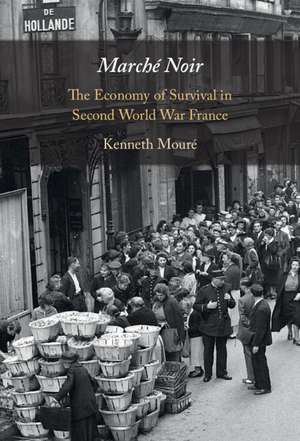Marché Noir: The Economy of Survival in Second World War France
Autor Kenneth Mouréen Limba Engleză Hardback – 22 mar 2023
Preț: 593.50 lei
Preț vechi: 652.20 lei
-9% Nou
Puncte Express: 890
Preț estimativ în valută:
113.57€ • 121.44$ • 94.69£
113.57€ • 121.44$ • 94.69£
Carte disponibilă
Livrare economică 27 martie-10 aprilie
Livrare express 13-19 martie pentru 35.84 lei
Preluare comenzi: 021 569.72.76
Specificații
ISBN-13: 9781009207669
ISBN-10: 1009207660
Pagini: 324
Dimensiuni: 152 x 229 x 19 mm
Greutate: 0.6 kg
Editura: Cambridge University Press
Colecția Cambridge University Press
Locul publicării:Cambridge, United Kingdom
ISBN-10: 1009207660
Pagini: 324
Dimensiuni: 152 x 229 x 19 mm
Greutate: 0.6 kg
Editura: Cambridge University Press
Colecția Cambridge University Press
Locul publicării:Cambridge, United Kingdom
Cuprins
1. The black market in wartime France; 2. L'économie de misère; 3. Curing the thermometer: price controls and the black market; 4. La terre, elle, ne ment pas: agriculture and the black market; 5. Market forces: industry and commerce; 6. Consumers in a world of scarce goods; 7. Illegality normalized; 8. Liberating markets and consumers; 9. Justice for les profiteurs de la misère publique; 10. Black markets in wartime.
Recenzii
'With immense research and compelling prose, Mouré analyzes how people of all kinds-rich and poor, rural and urban, producers and consumers, police and the policed, from Vichy officials and Nazi occupiers to Allied liberators-navigated the challenges and opportunities of France's wartime black-market economy. A superb integration of economic, social, and cultural history.' Herrick Chapman, New York University
'Moure's compelling book on the black market focuses on a critical aspect of life in France during the German Occupation. Moure's vivid account brings his deep understanding of economics and of the war to his investigation of the black market and its profound impact on politics, economics and daily life. Vichy's failure to control and enforce a system meant to ensure basic living standards all but compelled producers, distributors and consumers to turn to the black market, widening divisions in French society.' Sarah Fishman, University of Houston
'Moure's compelling book on the black market focuses on a critical aspect of life in France during the German Occupation. Moure's vivid account brings his deep understanding of economics and of the war to his investigation of the black market and its profound impact on politics, economics and daily life. Vichy's failure to control and enforce a system meant to ensure basic living standards all but compelled producers, distributors and consumers to turn to the black market, widening divisions in French society.' Sarah Fishman, University of Houston
Notă biografică
Descriere
Explains the extent, necessity and importance of black-market activity in France during the Second World War.
